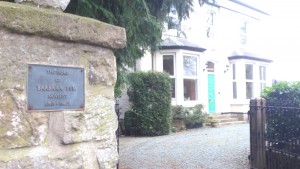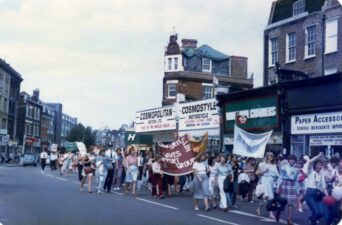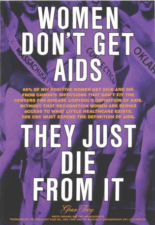WHN Admin.

Barbara Pym’s novels provide a social history of the period over which she wrote from the 1920s to 1980. [1]
Quotes from Pym’s diaries, notebooks and letters provide the background to her fiction and reminders that she was complex, an intricate combination of the Pym most familiar through A Very Private Eye An Autobiography in Diaries and Letters [2] and a woman less besotted by romance than her writing, a more feminist woman, much of whom remains hidden in the Bodleian or behind the village imagery in her novels. Pym’s image has been cultivated in a form that suggests that the church was her abiding influence, that she was politically conservative and an unhappy spinster. However, even her published work undermines the last contention – Some Tame Gazelle, an imaginary tale of herself and her sister Hilary in their 50s portrays two very contented, indeed happy, spinsters!
When A Very Private Eye was published, one of Pym’s friends complained about the image it presented of Barbara.
Hilary replied in no uncertain terms:
I do not agree with anything you say! …I cannot see how Barbara’s complicated character (and she was a very many sided person) can be accounted for without reference to these early outpourings…I don’t want Barbara to survive as a non-person outside her books – there are plenty of people already who think of her as daughter-of-the-vicarage… [3]
Barbara was certainly no ‘non-person’ or daughter-of-the- vicarage as the following quotes from her 1950s diaries and letters demonstrate:
In that play ‘The Making of Mao’ it is pointed out how violent and bloody the beginning of religion is and then it all peters out and deteriorates, is watered down, to tea and cakes in a church hall – and yet what would you have – martinis and caviar perhaps?[4]
As well as English Literature I was also continuing to read modern novelists, and particularly enjoyed the works of ‘Elizabeth’…Such novels as ‘The Enchanted April’ and ‘the Pastor’s Wife’ were a revelation in their wit and delicate irony, and the dry unsentimental treatment of the relationship between men and women which touched some echoing chord in me at that time…
…I felt resentful of being dominated by them and not being allowed to be myself at all…
I suppose I criticise and mock at the clergy and the Church of England because I am fond of them, and the same might be said about my attitude to men…I have always liked them very much …but have been able to look at them with detachment , a quality I admire and try to bring to all my writing…
The position of the unmarried woman – unless, of course, she is somebody’s mistress – is of no interest whatsoever to the readers of modern fiction…
I learned how it was possible and even essential to cultivate an attitude of detachment towards life and people, and how it was even possible for the novelist to do ‘field work’ as the anthropologist did…
Is the country necessarily more evil than the town? No, but evil in a different way[5]
Early titles for A Few Green Leaves: ‘This Soul’s Dark Cottage’, ‘Battered and Decayed’ and ‘Small Lives’.
The country seems so tame yet it has its sinister side not mentioned by Wordsworth.
It’s a cruel place. There’s a good deal of evil hidden away in the average English village and not always hidden, either.
Somewhere in the past where the emancipation of women was just about to start.
This is the morning Arthur picked (if that is the right word) four enormous pumpkins, one of which was so big that Sid could hardly stagger along with it. These would be for the competition at The Plough – a real test of male Chauvinist Piggery. [6]
…she used him and passed on. So often one sees men doing this it is heartening, encouraging and refreshing when a woman does.
…what is women’s work and men’s work?
And lastly, Marcia from Quartet in Autumn:
She seemed at once above and below any of the topical issues – even that convenient category ‘the old’ could not contain her…she becomes more and more eccentric.
[1] A piece about Pym’s fiction was published on the blog in November 2013.
[2] Hazel Holt and Hilary Pym (1984) Dutton, NY.
[3] Letter from Hilary Pym to Robert Liddell, 1984.
[4] This and the following quotes are from Pym’s diaries, MS Pym, in the Barbra Pym Collection in the Bodleian Library.
[5] MS Pym Notebook. The notebooks replaced the diaries in the 1940s, although by the 1970s she was again writing in a diary form as well as keeping notes and numerous drafts of her writing. This and the following quotes are from the notebooks.
[6] The following quotes are from MS Pym, Diaries, 1970s.


